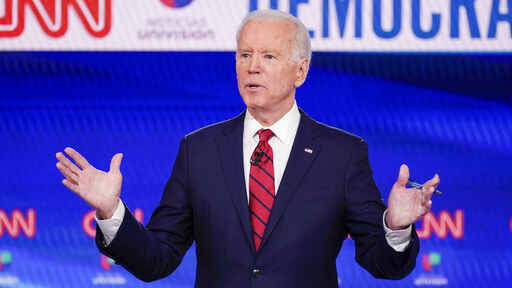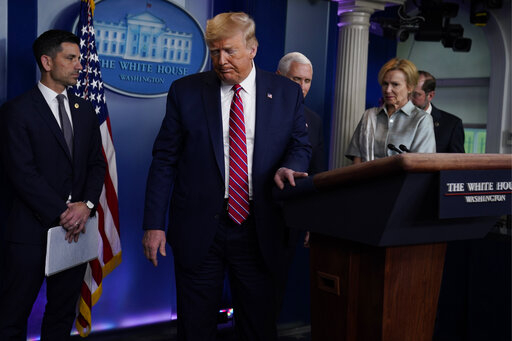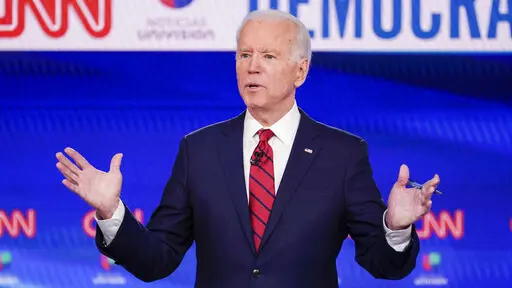
**Editors Note: **Stephen Ndegwa is a Nairobi-based communications consultant and international affairs columnist. The article reflects the author's views, and not necessarily those of CGTN.
Former U.S. Vice President Joe Biden is a gentleman. In fact, nothing in his demeanor betrays his political ambitions. I believe it caught many political analysts by surprise when he announced that he would vie for the American presidency on a Democratic Party ticket in the forthcoming November elections.
Already his former boss, former President Barack Obama, has endorsed him. In a video posted on April 14, Obama praised Biden's character and resilience, saying he has what it takes to lead America through a crisis similar to the current COVID-19 pandemic.
On April 28, former Democratic presidential candidate Hillary Clinton also weighed in on Biden's corner, saying, "I am thrilled to be part of your campaign and to not only endorse you, but to help highlight a lot of the issues that are at stake in this presidential election."
Clearly, this endorsement by some of the top influential figures in America's political arena has emboldened Biden. But just before Clinton's endorsement, Biden made a statement that excited the otherwise lackluster campaigns, a situation worsened by the ongoing COVID-19 crisis.
Speaking to a local affiliate of the CBS network in Miami on April 28, Biden said that if he were the U.S. president at the moment, "I would get much more engaged in the world. We can't step back. If in fact, for example, we solve the problem in the United States of America, and you don't solve it in other parts of the world, you know what's gonna happen? You are gonna have travel bans. You're gonna not be able to have economic intercourse around the world."
Symbolically, Biden was referring to the dwindling clout of the U.S. in recent years, especially after Donald Trump was sworn in as president in January 2017. To drive the point home, Biden warned that, "Look, when America goes alone – when America is first, it's America alone."
Biden thinks he can reclaim America from Trump's malaise. According to a scorecard on Trump's presidency published in the
The
Guardian
in December 2019, America has taken one step ahead, several steps backwards, as Trump seeks to stamp his authority and oftentimes roll back Obama's legacy.
For instance, while Trump was credited with an impressive economic performance, and appointing a sufficient number of judges, his critics cited him negatively for withdrawing from the Paris climate accord, fomenting an immigration crisis by banning emigrants from several Muslim and African countries, and habitually denigrating U.S. allies.
Another opinion in December 2019 by Simon Tisdall in
The Guardian
observed "Trump's disdain for the UN and other multilateral decision-making bodies, and his readiness to ignore international treaties. His go-it-alone chauvinism weakens U.S. leverage."

President Donald Trump leaves after speaking at a coronavirus task force briefing at the White House in Washington, DC, March 20, 2020. /AP
Trump's hate for multilateral organizations is obvious from his pronouncements about the European Union, the North Atlantic Treaty Organization and the World Trade Organization.
As Anne Applebaum noted in an opinion piece on July 2, 2018 in the
Washington Post
, "Trump hates the international organizations that are the basis of U.S. wealth, prosperity and military power."
The COVID-19 pandemic has brought to the fore what has been happening to America, both internally and externally. According to a 25-nation Pew survey held in 2018, 70 percent of the respondents said the U.S. under Trump downplayed the interests of other countries, and underplayed its role in addressing international problems.
Indeed, the U.S. has not been having "economic intercourse" like it used to. Trump's "America First" mantra has increasingly isolated and insulated the superpower at the global stage. Previously a champion of multilateralism, the U.S. is now increasingly behaving unilaterally.
But Biden says unless America gets more closely involved in international affairs, it will be enclosed in its cocoon. Therefore, the country has to engage itself more in solving global crises.
Referring directly to COVID-19, the Democratic Party candidate says if the status quo remains, America will also be stuck due to restrictions in overseas travel.
The managing director of the International Monetary Fund, Kristalina Georgieva, recently warned against "pandemic protectionism," where some developed countries hoarded medical equipment and pharmaceutical supplies for domestic use.
Georgieva stressed that "we would very much encourage countries to actually integrate their capabilities, rather than trying to keep it each one for itself."
If he finds himself in the White House after the November elections, Biden promised his first agenda would be to restore the U.S. funding Trump withdrew from the World Health Organization, definitely to restore the effectiveness and full mandate of the global health organization.
Multilateralism and diplomacy are obviously the only sustainable solutions to mounting global challenges. They enable countries to reach a consensus on a wide range of issues on the basis of mutual benefit, and to manage differences on the basis of mutual respect. Further, they strengthen mutual understanding and friendship between nations, helping to jointly address major international and regional issues.
(Cover image: Former U.S. Vice President Joe Biden participates in a Democratic presidential primary debate at CNN Studios in Washington, DC, March 15, 2020. /AP)
(If you want to contribute and have specific expertise, please contact us at [email protected])
 简体中文
简体中文

